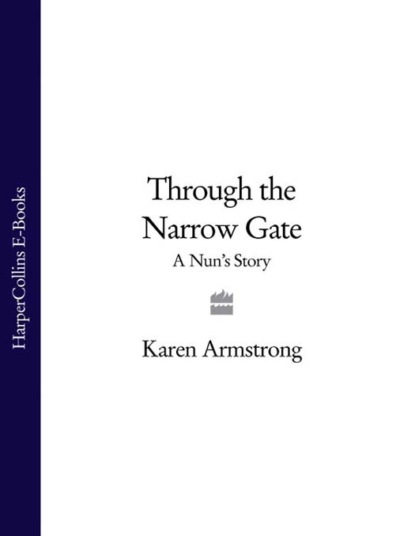По всем вопросам обращайтесь на: info@litportal.ru
(©) 2003-2024.
✖
Through the Narrow Gate: A Nun’s Story
Настройки чтения
Размер шрифта
Высота строк
Поля
Granny went on, dreamily. “I was terribly naughty at school! I remember once a priest came to give us a retreat. ‘In Heaven,’ he said, ‘you’ll be singing “Glory be to God!” forever and ever!’ and I whispered to the girl next to me, ‘How boring! I don’t think I want to go to Heaven.’”
“I know what you mean,” I said. “It sounds awful, doesn’t it? Glory be to God forever and ever.” But if you didn’t want to go to Heaven there was only one alternative. I shuddered. It was a dilemma.
“Unfortunately, the priest heard me whispering, and when he had finished his talk he said, very solemnly, ‘Who is the little girl who doesn’t want to go to Heaven?’”
“Oh no!” I breathed. “How dreadful! Did you own up?”
“Yes,” she smiled slightly and leaned against the wall, her eyes fixed dreamily ahead. “I had my Holy Innocents medal taken away from me as a penance.”
“Do you think you’ll go to Hell, then?” I masked the fearful import of the question with a giggle.
“Yes!” she laughed. “Oh, yes! I expect the devil’s got a nice warm spot for me down there! Do you think those potatoes are done yet?”
I prodded them. “Not quite,” I said, preoccupied. Hell terrified me. It seemed so hideously easy to go there. “But you have to commit a mortal sin to go to Hell, don’t you?” I asked. “A very serious sin indeed, knowing that you’re doing it.”
“Yes!” Granny laughed hollowly. “Yes, that seems to be the idea.”
I looked at her. She seemed so harmless. And I loved her with a great rush of tenderness.
“Well!” Granny said, looking wistfully at the green bottle. “I think we’d better be getting back to the others. You dish up those potatoes and leave them in the hot drawer, will you? Thanks. I’ll just put one or two things away in the larder.”
She disappeared into the tiny little room next door, carrying the bottle of Worcestershire sauce and—I saw out of the corner of my eye—the green bottle. Standing at the sink, waiting for her, I saw the darkening garden outside looking misty and sinister in the autumn twilight. The world seemed a puzzling place. “I think you’ll have to go to Heaven, you know, Granny,” I said. “I don’t think you’re bad enough for Hell.”
My mother’s eyes bored into Granny as we entered the room.
I went over and sat close to my mother, smiling up at her, feeling that, in some way I didn’t understand, I had been disloyal. Saturated with warmth, I gazed into the flames of the fire.
“Just time for another drink,” Granny said briskly. “We ought to leave the meat to stand for a few minutes, don’t you think? Is Karen old enough to have a sherry?”
“Oh, yes, I think so,” my mother’s voice was cheery, consciously filled with the birthday spirit. “Just a small one. Would you like a sherry, Karen?”
“No,” I answered promptly, without thinking. The refusal was automatic. For some reason that I would not analyze, it was impossible for me to accept. “No, thank you, Granny.”
I watched her walk across the room, replenishing my parents’ glasses. As she navigated the coffee table, she stumbled slightly, and my mother’s sharp intake of breath cut through me. But as soon as she caught me looking at her, my mother smiled and said, “What were you two gossiping about in the kitchen?”
“Oh, Granny was telling me about her school,” I answered. “It still sounds awfully like my school, you know. We do all the same things, have all the same customs.”
“Mmm,” my mother said vaguely. “You were happy at school weren’t you, Mummy? Like Karen.” For a moment her eyes were wary as she listened to what she had said, startled. “You like the same things.”
“Happiest days of your life, Madge?” asked my father genially.
Granny glanced at my grandfather, who was still quite oblivious to his birthday celebration, and her eyes wandered aimlessly round the room.
“Yes, I expect they were in a way.”
“School was?” I said, appalled.
“Yes,” Granny said musingly. “You know, you think you hate it while you’re there, but lately I’ve been looking back at those days over and over again. We were happy.” She sipped her sherry reflectively.
I looked at Granny in amazement. Surely not. Everybody knew that school was terrible; life began once you had left it behind you. Didn’t it?
“I suppose they were,” Granny repeated quietly. “You know,”she smiled inwardly, “when I was just a little older than Karen—oh, I must have been about sixteen or seventeen—I wanted to be a nun. My mother wouldn’t let me. You never know,” she added obscurely, “it might have made all the difference ... Yes, perhaps I should have been a nun.”
Seeds had been planted: Lindsey’s illness, Miss Jackson’s decision, and this conversation with my grandmother were helping me to grow accustomed to an idea: the idea that people like me could become nuns. These incidents raised a question that at the time I preferred not to examine too closely. It was to be some years before the seeds blossomed into a decision.
The year 1960 was an important one for me. I was fifteen and eager to break out of the sheltered world of childhood, but the adult world turned out rather differently from the way I’d expected.
One thing that turned out badly was my friendship with Suzie.
I remember how it all came to a head one hot September afternoon. Suzie and I were sitting in our garden. She was lying sprawled in a deck chair, her skin-tight jeans stretched over her thighs, her breasts peaking provocatively under her orange tee shirt. I glanced down at my own lumpy body. Suzie was formed. She was complete and ready for life. Her lips were coated with orange lipstick; her nails—why would mine never grown that long?—were gleaming orange talons. She had done her best with me. Under her tutelage I was wearing a similar pair of jeans and a grey shirt, and my lips were covered with a chalky pink lipstick. Like Suzie’s, my hair was back-combed into a tangled beehive. I should look all right, I reflected sadly. In fact, if I concentrated on my face, I didn’t look too bad. My teeth were much too big, of course, but from the neck upward, I would just about pass. My body had nothing to do with my head, however. I could never look finished, all of a piece.
“How can you bear the thought of going into the Sixth Form, Karen?”
“I don’t know,” I replied untruthfully, “it seems endless.” The trouble was, I thought, I wanted to do A-levels and go on to college. Suzie—and indeed all my friends—couldn’t wait to get into the real world. Suzie herself, having scraped through five O-levels, was leaving school and was about to embark on a secretarial course. The prospect of that just didn’t appeal to me. It was no good; I was just different from her. But I did so want to belong to her world.
“You really ought to get out more,” she said, “you know, drink a bit, smoke a bit, find a boyfriend. You’re really not a bluestocking, you know, Karen. You can be really good fun once you let yourself go a bit. And you would, once you got a boyfriend!”
“Fat chance!” I muttered gloomily. Fat, I thought, looking down at myself, was the word.
“By the way,” she asked casually, “is Tony in?”
“Who?” I asked blankly. “Oh, you mean Anthony! Yes, he’s here. He’s in the sitting room, I think, doing something or other. Why?”
“Just wondered,” Suzie replied lazily.
Anthony, my cousin, was staying with us. Two years older than I, he was about to enter the police force, having decided not to carry on doing A-levels at school. Another one.
“It’s no good,” I said in a burst of honesty. “I’ll never be successful with boys like you are! I just don’t look right and I can’t talk to them.”
“Goodness, you don’t want to talk to them, do you? There are much more interesting things to do with boys than just talking, for God’s sake!”
I laughed knowingly, hoping that it was convincing. In fact, the whole area of sex was a mystery to me. It seemed hedged round with dangers. It was a wonderful thing, I had been told again and again. But if you did it when you were not married or when you were deliberately preventing a baby from being born (by means of some mysterious devices), it was a mortal sin. And that meant that if you did not truly repent you went to Hell for all eternity. And what exactly was “it” anyway? In biology lessons the nun who taught us made us read the chapter on reproduction by ourselves. It seemed to be all about rabbits, and I didn’t think I had much in common with a rabbit. The technical details of sex were shrouded in a disturbing obscurity. And then once you got a boyfriend there was all that business about “going too far” or “making yourself cheap”.
“Suzie,” I asked diffidently, “aren’t you ever afraid that you’ll get pregnant when you go with boys?”
“Course not!” she laughed confidently, happily ignorant of the fact that in three years’ time she would “have to” get married. “There’s loads of things you can do before you go that far.” I blinked uncertainly. What on earth could she be talking about? And what about those dark masculine urges that I was constantly being warned could not possibly be controlled? But confessing my ignorance would be too humiliating.
“Yes, I know,” I lied, “but don’t they want to do the whole thing?”
“Oh, yes,” she answered complacently, stretching her body in the sun like a contented cat. “But I can always handle them. By the way,” she sat up suddenly, “can I go and phone my mother to tell her when I’ll be in?” She dusted a few blades of grass off herself.
“Sure,” I said, reaching for my book. It was The Mill on the Floss. I watched her go into the house and turned back with relief to the ordered world of literature. I’d nearly gotten to the end of the novel. Poor Maggie. I knew just how she’d felt as a child. Ugly, precocious, a misfit. Then she’d become a beauty. Her position was hopeless, but the ugly duckling blossomed into a swan. I read of her drifting down the river with Stephen Guest, conscious of impending disaster.
After a while I glanced at my watch. Good heavens, Suzie’d been gone for a quarter of an hour. Her telephone conversations with her mother were usually brief to the point of rudeness. What could be keeping her? I went in to see.
I walked through the kitchen into the front hall. There, through a crack of the door that had been carelessly left ajar, I saw them.
Suzie was sitting on the hearthrug, her head bent back, her eyes staring blindly at the window. My cousin Anthony leaned over her. One of his hands kneaded her back, the other hand squeezed and paddled in her neck. Even as I watched, their lips joined in what I recognized was a familiar embrace.









